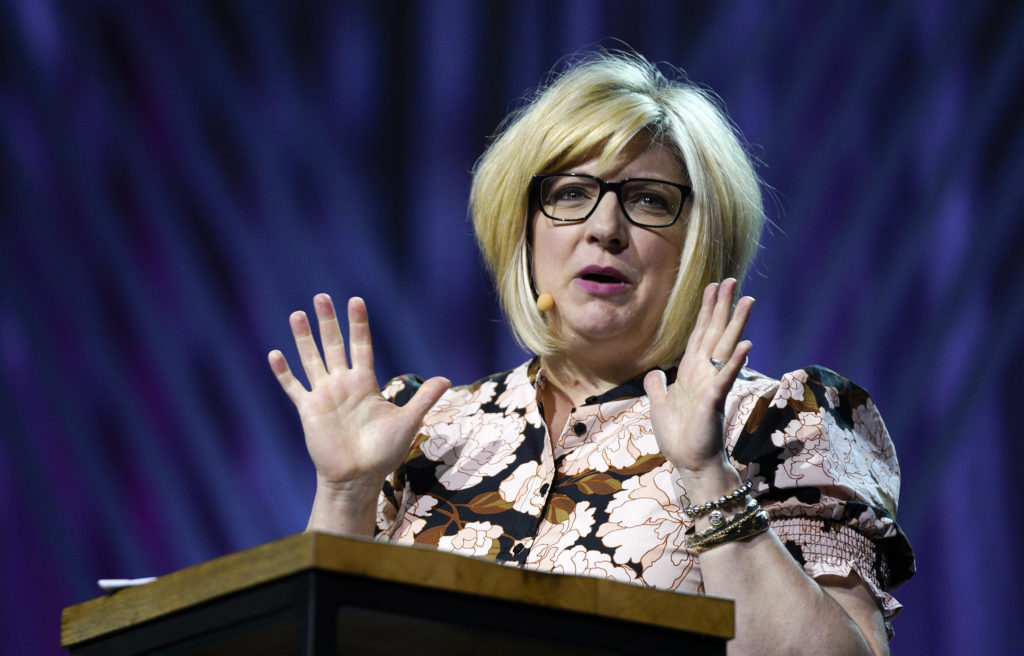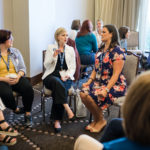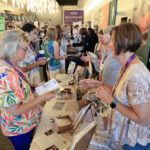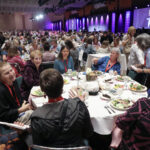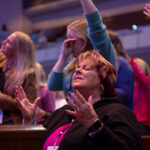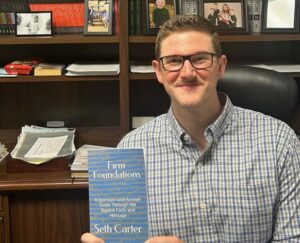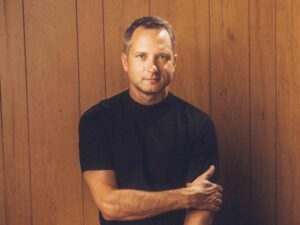
NASHVILLE (BP) – Amy Hannon, a minister’s wife and author of “Love, Welcome, Serve,” urged women to overcome cultural barriers to biblical hospitality and invite people into their homes during the women’s track of the Send Conference 2021 June 14 in Nashville.
The Monday morning session with 2,000 women at the Music City Center also included a testimony from author Sheila Walsh and a panel featuring professor Katie McCoy, pastor’s wife Kim Hardy and children’s advocate Christi Haag.
Romans 12:9-13 was the theme passage, and Hannon focused on the end, which says to share with the Lord’s people who are in need and to practice hospitality.
“‘What do we have to share?’ you might ask,” Hannon, whose husband has been a pastor at Fellowship Bible Church in northwest Arkansas for 26 years, said. “We share our lives. We share our homes, our families and our resources. We share compassion, wisdom, joy, laughter and love.
“We share extravagant grace and mercy. We share our hurts and our fears and how God is the healer and the one who makes us whole. We share our habits and our hang-ups and how He alone is the one who satisfies.”
Hannon believes in the power of biblical hospitality, she said.
“I believe that a simple invitation for connection and community over a shared meal is the most natural and genuine approach to sharing the hope of Jesus in the lives of others,” she said.
In recent years, though, women have stopped opening their doors to friends and neighbors as frequently as they did in the past, Hannon noted. “One of the main reasons is because we’ve confused hospitality with entertaining.”
“Biblical hospitality says, ‘What God has given me, I share with you,’ when entertaining often says, ‘Look what I have. Look what I can do.’ The focus is different,” Hannon said. “Biblical hospitality values connection over perfection, people over presentation, sharing over showcasing.”
Women have been influenced by the messages of the world pedaled on Pinterest and Instagram, Hannon said, and while there is “nothing wrong with having pretty things,” the enemy has convinced women that all of that is necessary in order to open their homes.
Hannon said she lived for years confusing biblical hospitality with entertaining.
“I worked really, really hard to make much of me and not much of Jesus,” she said. “I overthought everything, prayed about nothing. I nearly crumbled under the weight of a self-inflicted pressure that I was supposed to be, do, host, cook, live a certain way, and I was completely sideways, and I was miserable.”
When Hannon learned to open her home, she was able to show authenticity to those around her and to use her home as a springboard for far-reaching ministry, she said.
Walsh, who attends the Dallas-area Prestonwood Baptist Church in Plano, told how she grew up in a Baptist church in Scotland and endured a childhood tragedy that nearly destroyed her. At age 21, she graduated from London Theological Seminary but was plagued by a sense of shame and the idea that she had to perform to please God.
“I found the perfect place to hide: Christian ministry,” Walsh said. “Think about it. Who’s going to come up to me and say, ‘Put that Bible down or we’re going to have an intervention. No more 2 Kings for you, lady.’
“God is the only one who knows our hearts and knows whether we’re serving out of pain or passion, out of a calling or a wound so deep you don’t know where else to hide.”
She moved to the United States, worked for the Billy Graham Evangelistic Association and even became a co-host of “The 700 Club” before she hit rock bottom.
“One of the greatest gifts that God has ever given to me is allowing my life to fall apart so that He could teach me that His love is not based on my performance. It’s based on who He is and on the finished work of Christ,” Walsh said.
Something that changed her outlook is a quote from the Fourth Century: “Whereas most of the Bible speaks to us, the Psalms speak for us. They give us a language.” Now she speaks the Psalms to God daily.
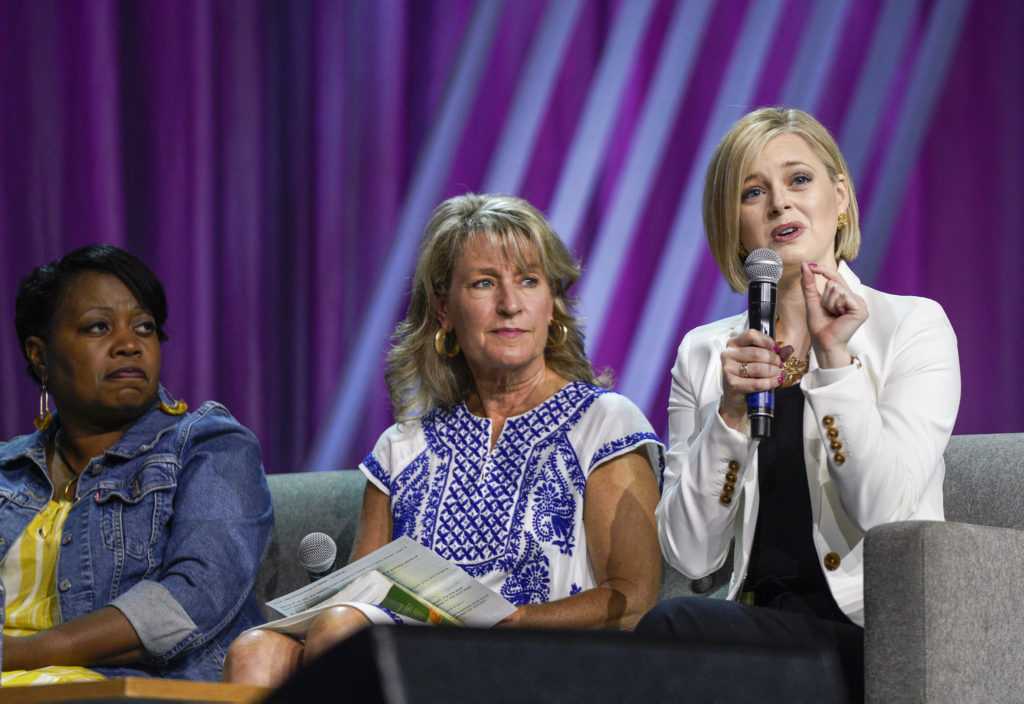
Katie McCoy, assistant professor of theology in women’s studies at Texas Baptist College, said culture tends to make love mean approval. Christians tend to respond to that in two extreme ways.
“One is to try and make that kind of work and kind of baptize it with Christian terms,” McCoy said. “Then the other extreme is one that might be a little more subtle, and it is to so rebuff it, so go against it that we just become hardened, and we speak the truth in a way that no one would want anything to do with it.
“One of the things that we see with the Lord Jesus and then we especially see in the teachings of Paul is love is how you prefer others, how you have a posture of humility, how you have this posture of seeing everything in your life as being about serving someone else.”
People are hungering for true love, McCoy said, the kind referenced in Romans 12.
“I think to really do that contrary to the way that we see the world expressing love it means loving them enough to tell them what is true but to tell them what is true in a way that attracts them to the Lord Jesus, not makes it seem like it’s so impossible they could never get there,” Mc Coy said.
Kim Hardy, a church-planting wife at Lifepoint Church in Marietta, Ga., shared some of the marriage struggles that led her and her husband Dexter to start Marriage Talk, a ministry dedicated to building healthy and thriving marriages.
“Everybody in this room who has been married to an imperfect man married to an imperfect woman, you will encounter discouragement,” Hardy said. “One of the places where Dexter and I saw discouragement was in the way we were communicating.”
As their conviction over the problem grew, Hardy recalled God saying to her, “You two are acting more like lawyers than people who love each other. You’re building cases rather than building each other up.”
Now she has learned to be her husband’s safe place, she said.
“The deeper the pain, the fewer the words. When I’m in his presence, I’m praying, ‘God, give me the words and to understand that you’re using this moment to grow my husband, and I’ve got to be in this valley with him and go through this with him, looking at you.’
“One of the things God taught me about when we get to that place where we have a fear of failure, that’s because we have unrealistic expectations of what we’re supposed to be doing for God.”
Christi Haag, whose husband Jerry is the president of One More Child, a children’s advocacy organization, said a breast cancer diagnosis two years ago took her prayer life to a new level. During those difficult months, God gave her a four-part formula for each day.
“He told me, ‘Christi, every day you get up and do these four things, and you will have that fresh walk with me,’” Haag said.
The first thing God told Haag to do, she said, is to begin a conversation with Him before her feet hit the floor in the morning.
“That simple thing was a game-changer for me. I try to do it every morning. Before my feet hit the floor, I’m starting a conversation with Him,” Haag said.
The second thing is to get serious about God’s Word by reading both the Old and New Testament.
“I think many of us say we believe the Bible from cover to cover, but we’ve never read it from cover to cover,” Haag said.
The third part of the formula is to see people with God’s eyes.
“He sees everyone in one of two ways. You’re either saved or you’re not,” Haag said. The saved become partners in Kingdom work, and the lost become people she can tell about Jesus.
The fourth component is to “just say sorry,” she said, emphasizing confession because “sin is serious to God.”
